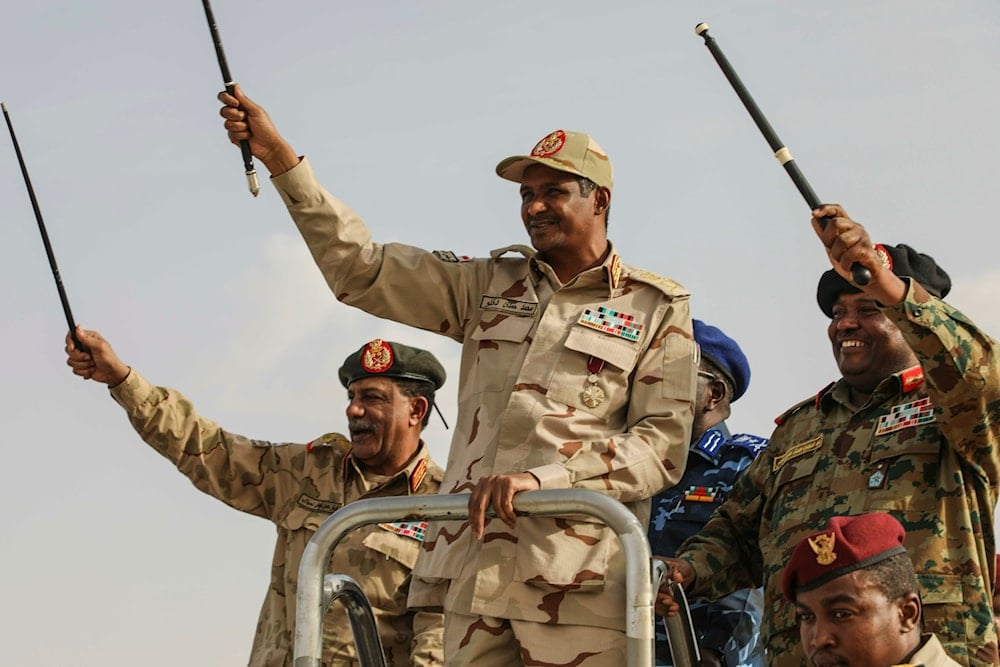Sudan will be united whether by peace or by war: RSF chief
The Rapid Support Forces take full control of El-Fasher, forcing the Sudanese army's withdrawal and raising fears of escalation.
-

Gen. Mohammed Hamdan Dagalo, center, then-deputy head of the military council, greets the crowd during a military-backed tribe's rally, in the Nile River State, Sudan, Saturday, July 13, 2019 (AP)
Mohammed Hamdan Dagalo, the commander of Sudan's Rapid Support Forces, stated that the unification of Sudan will be achieved, "whether through peace or through war." His remarks came in a speech broadcast on Wednesday, following his forces' seizure of the city of El-Fasher, which was the army's last stronghold in the western Darfur region, three days prior.
In a video speech broadcast on his official Telegram channel, Dagalo pointed out that "the liberation of El-Fasher has shifted the momentum in favor of Sudan's unity," adding, "And we say that the unity of Sudan will definitely be achieved, whether through peace or through war."
Sudanese Armed forces withdraw
On October 28, the Chairman of Sudan's Sovereignty Council, Abdel Fattah al-Burhan, announced the Sudanese army's decision to withdraw from El-Fasher, citing the systematic destruction and killings of civilians perpetrated by the Rapid Support Forces (RSF), which had previously declared full control over the provincial capital of North Darfur.
In a televised address delivered via the armed forces' X channel, al-Burhan stated that a consensus was reached between the military and the local security leadership in El-Fasher to withdraw from the city in order to protect the lives of civilians.
Al-Burhan added that the army remains capable of turning the tide and achieving victories, asserting its alignment with the people's will while condemning the international silence over crimes in El-Fasher, which he characterized as clear violations of Security Council resolutions and international norms, with the world watching unaccountably.
Fate of nearly 250,000 civilians concerning
On October 26, the Rapid Support Forces announced that they had seized control of El-Fasher, effectively eliminating the Sudanese army’s last major stronghold in Darfur, which would mean that the RSF now control all five states in the region.
Concerns are also mounting over the fate of nearly 250,000 civilians remaining in El-Fasher, amid reports of possible reprisals and further escalation. Masad Boulos, US Presidential Advisor for Arab and African Affairs, warned that the RSF’s full control over Darfur could have “serious and worrying consequences in the future regarding partition.”
Earlier, Sudan's Information Minister, Khaled al-Aysar, accused the United Arab Emirates of directly and fully financing the Rapid Support Forces militia, which he said led to the fall of El-Fasher. Additionally, he indicated that the RSF militia has killed tens of thousands of Sudanese and must be classified as a terrorist organization.
How it all started
The conflict in Sudan, which erupted in April 2023, stems from a brutal power struggle between the Sudanese Armed Forces (SAF), led by General Abdel Fattah al-Burhan, and the Rapid Support Forces (RSF), a powerful paramilitary group commanded by Mohammed Hamdan Dagalo, known as Hemedti.
The two factions were former allies who jointly seized power in a 2021 coup following the ouster of Omar al-Bashir.
Alliance collapses
Their fragile alliance collapsed over disputes about integrating the RSF into the national army and control of the state. What began as a clash in the capital, Khartoum, has spiraled into a nationwide conflict marked by mass displacement, ethnic killings, particularly in Darfur, and a deepening humanitarian catastrophe.
The conflict has drawn in regional powers, destabilized neighboring countries, and left millions facing famine, while diplomatic efforts to broker a ceasefire have repeatedly failed.

 4 Min Read
4 Min Read










